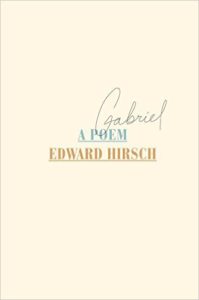Gabriel: A Poem
 by Edward Hirsch,
by Edward Hirsch,
Knopf Doubleday, 2014,
96 pp, hardcover and paperback,
ISBN: 978-0-385-35373-1 (hardcover) and 978-0-8041-7287-5 (paperback)
Buy the Book
Poetry has replaced religion for me as a sustaining force in my life. Often when I go to the Grolier Poetry Book Shop on a Friday night, there are flashbacks to the Chicago synagogue that sustained me through my eighteenth year. Poets like Marge Piercy and Ed Hirsch — not the synagogue or the Bible — are now the places that I go for spiritual refreshment. Thanks to poets like the aforementioned and my focus on poetry, I have come to believe that there are high tides and low ebbs in every spiritual tradition. All should be respected, and none should be taken for granted.
Gabriel: A Poem, by Edward Hirsch, has taught me more about the unconditional love a parent must always have for a child than I thought I had learned while teaching and raising children. Full disclosure: I graduated from the same small college as Ed, who is about ten years younger, so he has always been in my rear view mirror. We’ve had many good conversations. I’ve known about his son Gabriel’s unconventional life and the diagnosis of Tourette’s that never quite fit the actual case.
Since hearing a few vague details of Gabriel’s death, I had not been able to fathom the pain that Ed must have been going through — that is, until I read his masterful poem. The poem is so powerful that I can write to Ed again, and say, I think I understand. Even though you have a broken heart, you are a fine father. You will never stop caring for the world’s children and writing poems that care for them. I can say that his poem is completely accessible to any parent who has reached, with a child, impasses that can be overcome with unconditional love.
While Gabriel was very much alive and full of promise, Hirsch wrote a chapter on elegies, “Three Initiations,” that appears in his now classic How to Read a Poem and Fall in Love with Poetry (1999). Much of this chapter gives clues to how to approach Gabriel: A Poem, Hirsch’s own heart-rending elegy. So I use Hirsch’s own words to guide me through.
In the book-length poem, Hirsch mourns and looks for solace in
the act of writing. He does, he says, “what Freud calls the work of mourning, ritualizing grief and thereby making it more bearable. . . . ” He “turns loss into remembrance”:
I peered down into his face
And for a moment I was taken aback
Because it was not Gabriel
It was just some poor kid
Whose face looked like a room
That had been vacated.
Again, I turn Hirsch’s own words, from How to Read a Poem, to what I hope has happened for him in Gabriel: “The elegy opens up a space for retrospect (‘I see now’), for overwhelming personal feeling, and it drives a wordless anguish toward verbal articulation.” Again the parent at his child’s bedside, Hirsch gains that tender view:
But then I looked more intently
At his heavy eyelids
And fine features
The elegy also “establishes a precise relationship” between Hirsch and his beloved son. Hirsch reaches the point he describes by immersing himself in the poetry of grief. In this process, he passes through a white-hot intensity, out of which comes utter honestly about his loss, which finally brings him to — for this reader, and fervently I hope for my friend — a true “richness of feeling” for his departed son.
He had always been a restive sleeper
Now he was weirdly still
My reckless boy
By praising Gabriel as “My reckless boy,” Hirsch also names the most recent of his son’s dysfunctions and arrives at some sort of understanding.
Another clue of how Hirsch feels for his son comes in his glimpse back to the Humanities class in which a young Grinnell teacher named Carol Parssinen led him to discover the healing power of The Iliad. Homer’s epic “opened up a space in me that made it possible to name what I would feel. . . . ” His descriptions of Gabriel are infused with much of that power:
Dressed up for a special occasion
He liked that navy-blue suit
And preened over himself in the mirror
Hey college boy the guy called out
On the street in Northampton
You look sharp in those new duds
Hirsch says that he loved how “unflinching” Homer was: “I recognized [the Iliad’s] demonic power, its outsize emotion and epic grief. I was wounded by its truth. And I was also healed by it.” Finally, we can only hope that what Hirsch learned about that ancient poet’s poetry — “I was also healed by it” — is also true today about his own words to Gabriel.
— Mark Schorr

